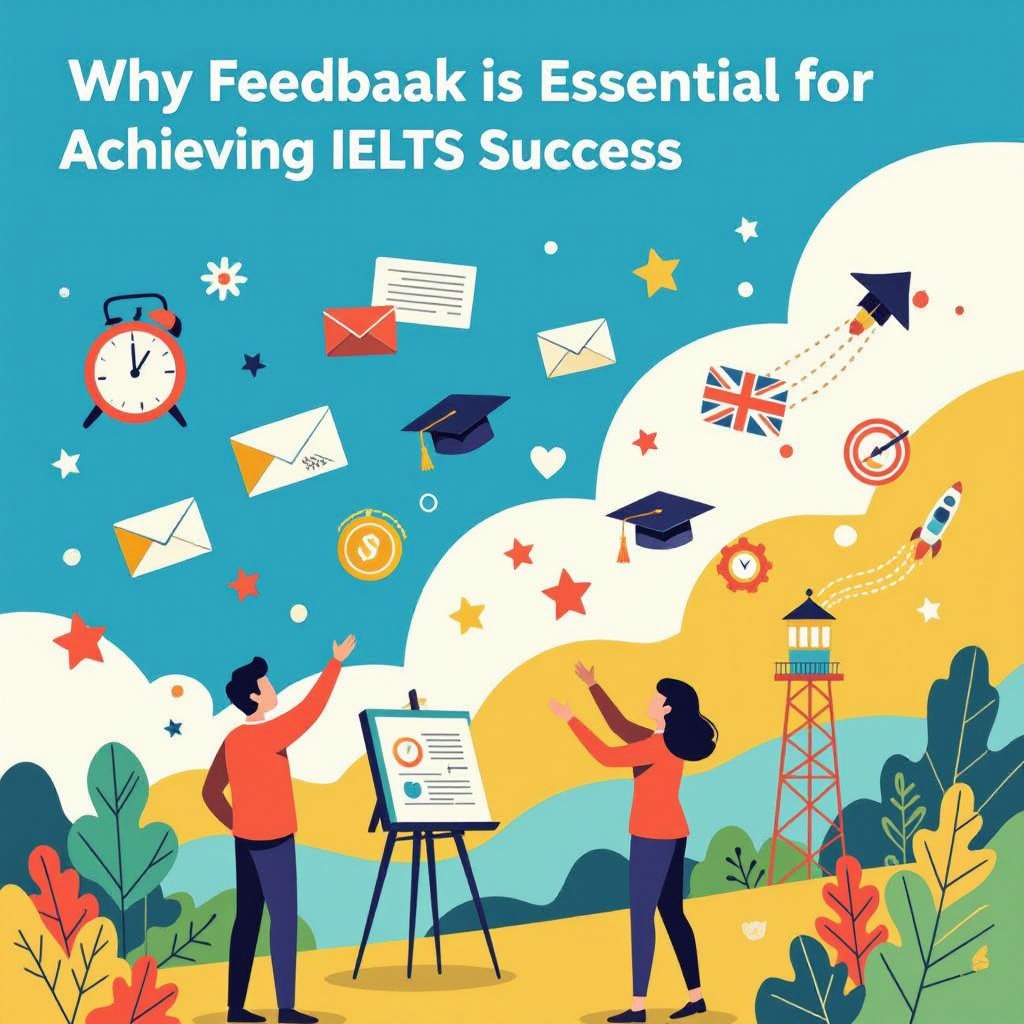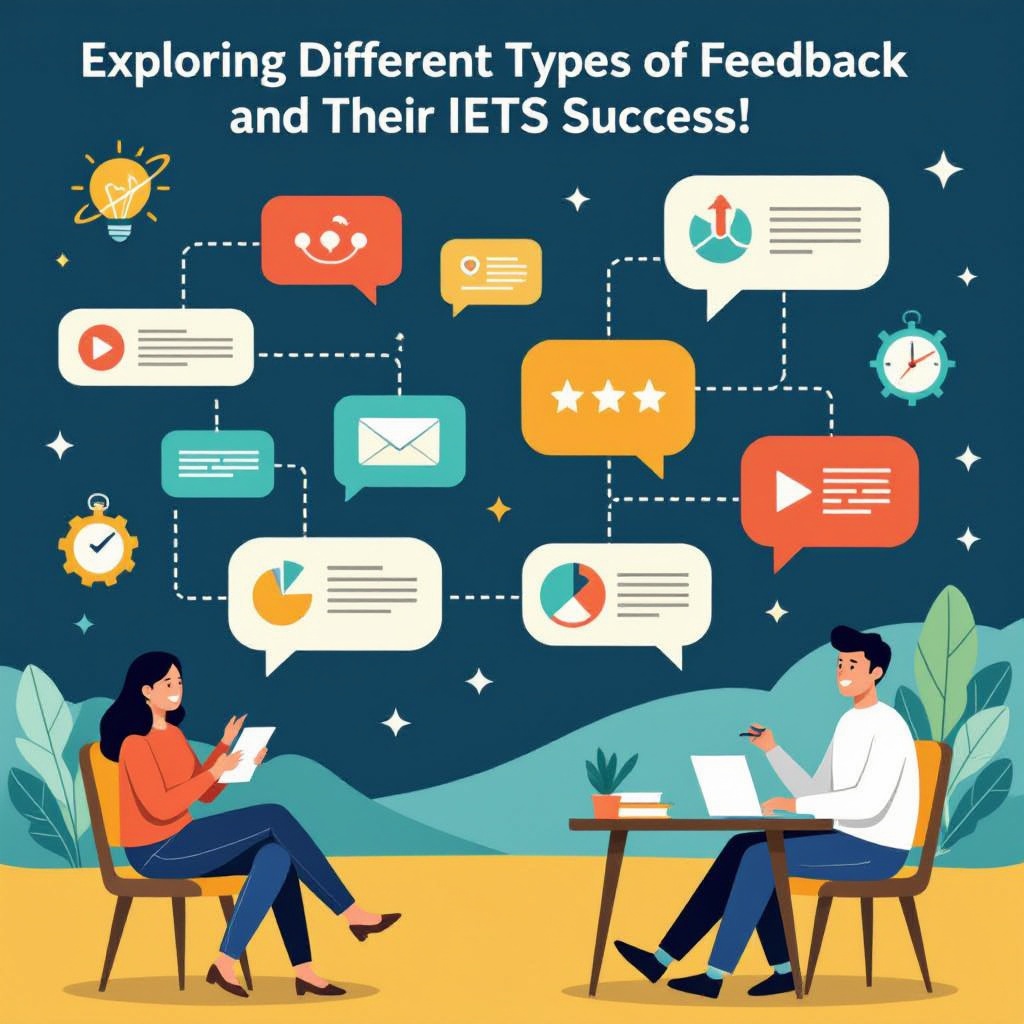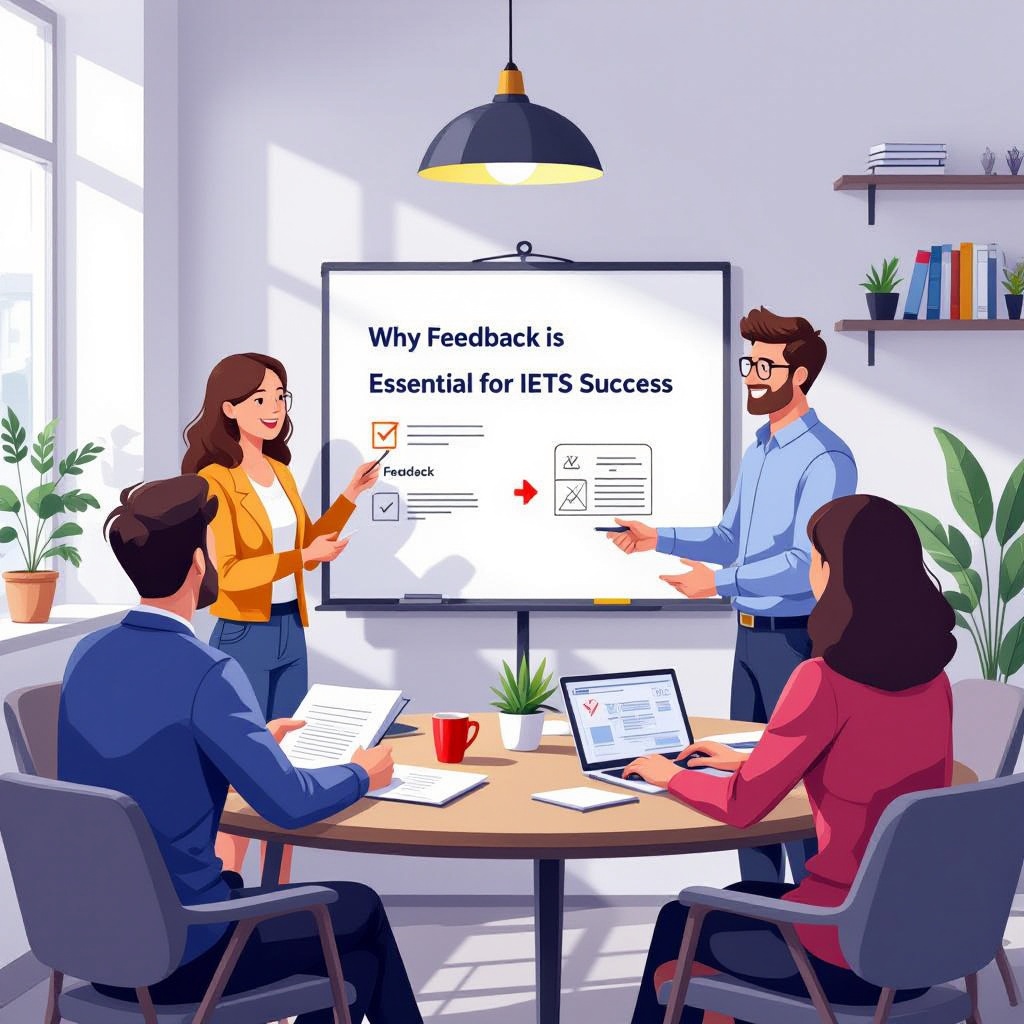Feedback plays a crucial role in boosting success on the IELTS, especially in writing and speaking. These sections demand nuanced language skills and alignment with examiner evaluation. For listening and reading, self-assessment might work, but writing and speaking benefit significantly from expert feedback. This guidance pinpoints areas needing refinement, aligning candidates with assessment criteria and fostering improvements in language proficiency.
Key Takeaways
- Feedback is essential for honing language skills in IELTS writing and speaking, demanding evaluation beyond self-assessment.
- Instructor feedback is favored by 70% of candidates, highlighting its impact on enhancing sentence structure, vocabulary, and coherence.
- Inter-rater reliability for IELTS Writing and Speaking points to the importance of expert feedback for achieving higher band scores.
- Various feedback types, including peer and AI-driven options, provide unique insights, each adding valuable perspectives to preparation.
- Feedback turns potential weaknesses into strengths, enabling noticeable improvements in band scores, especially from Band 6 to Band 7.
The Essential Role of Feedback in Achieving IELTS Success
Feedback plays a key part in achieving success with the IELTS, particularly in writing and speaking, where nuanced language skills are vital. Unlike listening and reading, which candidates can self-assess, writing and speaking require examiner evaluation. This makes feedback indispensable for pinpointing areas in need of refinement.
Engaging with feedback is instrumental in improvement. It provides insights on how to enhance sentence structure, vocabulary, and coherence. A significant 70% of students consider instructor feedback more valuable than peer or automated options, highlighting its benefits for IELTS success. Feedback not only guides improvement but also boosts confidence, so candidates are better prepared for their test day.

Data-Driven Insights: Why Feedback Matters
Understanding the inter-rater reliability for IELTS Writing, which stands at 0.95, and Speaking, at 0.88, shows just how crucial expert feedback is. Such feedback ensures your improvements align with the assessment criteria needed for a higher band score.
Regular and specific feedback directly impacts grammar, vocabulary, and task achievement. While rote practice might seem helpful, targeted feedback offers significantly better results. It allows you to focus on precisely where improvements are needed for effective progress.
Collaborative, learner-driven feedback contributes to even greater writing gains. This insight is backed by statistics that show learners who engage in collaborative feedback sessions often surpass those who don’t in terms of writing improvements. If you’re looking to improve your IELTS, feedback isn’t just an added bonus—it’s a pivotal part of the process.

Exploring Different Types of Feedback and Their Impact
Feedback is crucial to IELTS success, and understanding the different types offers an advantage. Instructor feedback often stands out. It’s considered reliable for academic growth, usually turning vague concerns into clear strategies for improvement. Instructor feedback’s popularity backs this up, with over 70% of candidates preferring it.
Peer feedback shouldn’t be overlooked. It fosters collaboration and offers insights from different perspectives. Engaging in IELTS feedback sessions with peers can mimic the testing environment and reduce anxiety. These sessions also enable candidates to exchange strategies and share experiences.
AI-driven feedback has gained traction too. It’s efficient and often delivers immediate results. Tools like IELTS essay correction services save time by pinpointing areas for revision, boosting language proficiency in distinctive ways compared to human feedback.
Over 85% of candidates find feedback helps clarify evaluation criteria and improve performance. In personalized IELTS coaching in the UAE, educators focus on tailor-made strategies. They address particular weaknesses and enhance overall exam preparedness.
Consider varied feedback types to maximize learning and development. Instructor feedback still leads in trustworthiness and precision, but incorporating peer and AI-driven feedback can also provide a comprehensive preparation experience. The key is to utilize the strengths of each feedback method to gain a well-rounded perspective on the IELTS criteria and exam techniques.

Best Practices for Effective Feedback in IELTS Preparation
To truly excel in IELTS, first focus feedback on the major errors. Highlighting these bigger issues early on makes a huge difference. Plus, sharing feedback frequently helps learners not only improve faster but also keeps them engaged.
Breaking down feedback by criteria gives a clearer picture of where improvement’s needed. For instance, focus on task achievement to ensure candidates address all parts of the question. Equally important are cohesion and coherence, which ensure the logical flow of ideas. By targeting these areas, learners can more strategically refine their skills.
Having received feedback, the key is putting it to use actively. This isn’t just a suggestion; it’s essential. Encourage using examples and checklists as concrete tools. For instance, if feedback notes recurring grammatical errors, a checklist can remind learners to look for these specific mistakes in future writings.
By implementing these strategies, learners can transform feedback into meaningful progress. When success on the IELTS is the goal, making feedback actionable and timely is indispensable.

Achieving Ultimate Outcomes: Feedback’s Role in Band Score Improvement
Feedback stands as a catalyst for notable improvements in IELTS band scores. Studies have shown that students often experience an increase of 0.5 to 1.0 in their band scores with focused feedback and preparation, highlighting its transformative power.
For those aiming to move from a Band 6 to Band 7, feedback isn’t just helpful; it’s essential. Examiner comments guide test-takers by pinpointing areas that need work.
Here’s why feedback is vital for progress:
- Identifying Weaknesses: It sheds light on specific language skills that require attention.
- Strategic Preparations: Offers a roadmap for efficient study sessions.
- Enhancing Confidence: Increases readiness and self-assurance for test day.
Using examiner insights marks a clear path to achieving your desired IELTS score, turning potential stumbling blocks into stepping stones.
Summary Table: Feedback Impact on IELTS Preparation
Focusing on feedback can tremendously aid in enhancing your IELTS scores. This summary table outlines areas within the exam and their need for feedback. Consider emphasizing writing and speaking, where feedback plays a vital role in your progress.
Essential Feedback Areas:
| IELTS Section | Feedback Requirement | Key Elements |
|---|---|---|
| Listening | Low | Comprehension |
| Reading | Low | Understanding |
| Writing | High | Examiner feedback, Structure |
| Speaking | High | Pronunciation, Fluency |
Writing demands detailed examiner feedback to tackle task response and coherence issues effectively. Speaking requires feedback particularly on pronunciation and fluency for a more natural delivery. Prioritize feedback in these areas to see marked improvement.
Sources:
IELTS Teaching – The Importance of Feedback for IELTS Students
ERIC – N/A (PDF Document)
IELTS – The Power of Student Feedback
IELTS – Test Statistics
Shahid Beheshti University EFL Journal – N/A (Article Title)
SAGE Journals – N/A (Article Title)
IELTS – Predictive Validity in the IELTS Test: A Study of the Relationship Between IELTS Scores and Students’ Subsequent Academic Performance
